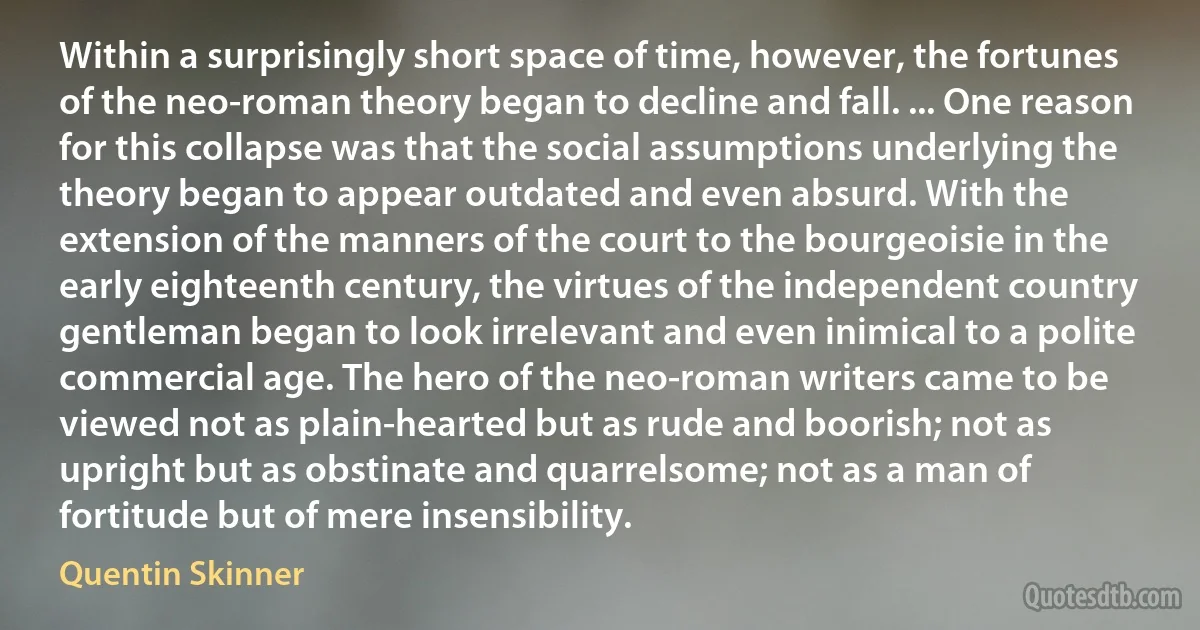
Within a surprisingly short space of time, however, the fortunes of the neo-roman theory began to decline and fall. ... One reason for this collapse was that the social assumptions underlying the theory began to appear outdated and even absurd. With the extension of the manners of the court to the bourgeoisie in the early eighteenth century, the virtues of the independent country gentleman began to look irrelevant and even inimical to a polite commercial age. The hero of the neo-roman writers came to be viewed not as plain-hearted but as rude and boorish; not as upright but as obstinate and quarrelsome; not as a man of fortitude but of mere insensibility.
Quentin SkinnerRelated topics
age appear begin bourgeoisie came century commercial country court early eighteenth extension fall gentleman hero insensibility man mere reason short space time upright mannersRelated quotes
Even when altruism is allowed (as, for example, in Gary Becker's model of rational allocation), it is assumed that the altruistic actions are undertaken because they promote each person's own interests; there are personal gains to the altruist's own welfare, thanks to sympathy for others. No role is given to any sense of commitment about behaving well or to pursuing some selfless objective. All this leaves out, on the one hand, the evil passions that early theorists of capitalism contrasted with self-interest and, on the other, the social commitments that Kant analyzed in The Critique of Practical Reason and that Adam Smith discussed in The Theory of Moral Sentiments.

Amartya Sen
The Christian movement began with John the Baptist. ... in his recorded teaching to the people there is not a word about the customary ritual of religion, about increased Sabbath observance, about stricter washings and sacrifices, or the ordinary exercises of piety. He spoke only of repentance, of ceasing from wrongdoing. He hailed the professional exponents of religion who came to hear him, as a brood of snakes wriggling away from the flames of the judgment. ...The way to prepare for the Messianic era and to escape the wrath of the Messiah was to institute a brotherly life and to equalize social inequalities.

Walter Rauschenbusch
The aesthetics of painting were always in a state of development parallel to the development of painting itself. They influenced each other and vice versa. But all of the sudden, in that famous turn of the century [1900] a few people thought they could take the bull by the horns and invent an aesthetic beforehand. After immediately disagreeing with each other, they began to form all kinds of groups, each with the idea of freeing art... The question as they saw it, was not so much what you could paint, but what you could not paint. You could not paint a house or a tree or a mountain. It was then that the subject matter came into existence as something you ought not to have.

Willem de Kooning
Psychology has a long past, yet its real history is short. For thousands of years it has existed and has been growing older; but in the earlier part of this period it cannot boast of any continuous progress toward a riper and richer development. In the fourth century before our era that giant thinker, Aristotle, built it up into an edifice comparing very favorably with any other science of that time. But this edifice stood without undergoing any noteworthy changes or extensions, well into the eighteenth or even the nineteenth century. Only in recent times do we find an advance, at first slow but later increasing in rapidity, in the development of psychology.

Hermann Ebbinghaus
Fabio Colonna deserves to be distinguished; for, although he gave way to the dogma that all fossil remains were to be referred to the Noachian deluge, he resisted the absurd theory of Stelluti, who taught that fossil wood and ammonites were mere clay, altered into such forms by sulfurous waters and subterranean heat; and he pointed out the different states of shells buried in the strata, distinguishing between, first, the mere mould or impression; secondly, the cast or nucleus; and thirdly, the remains of the shell itself. He had also the merit of being the first to point out, that some of the fossils had belonged to marine, and some to terrestrial testacea.

Charles Lyell
